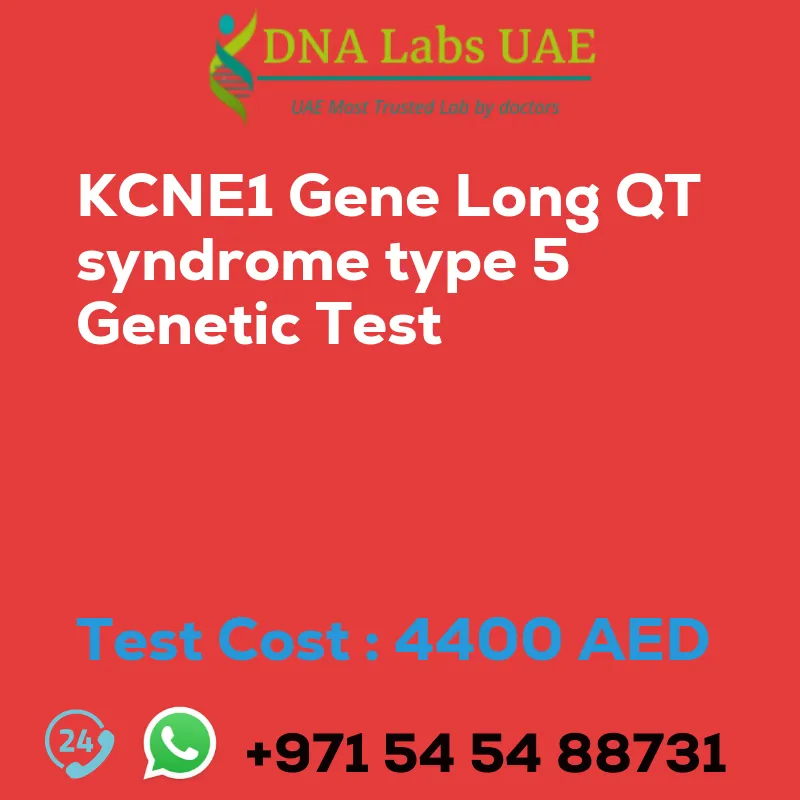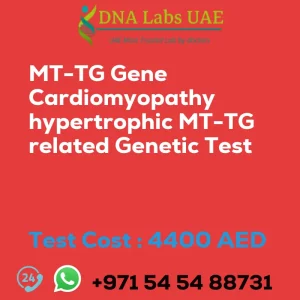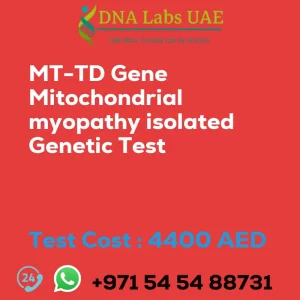KCNE1 Gene Long QT Syndrome Type 5 Genetic Test
At DNA Labs UAE, we offer the KCNE1 Gene Long QT syndrome type 5 Genetic Test. This test helps in diagnosing Long QT syndrome type 5 (LQT5), a cardiac disorder characterized by abnormal heart rhythms.
Test Components
The KCNE1 Gene Long QT syndrome type 5 Genetic Test includes the following components:
- Price: 4400.0 AED
- Sample Condition: Blood or Extracted DNA or One drop Blood on FTA Card
- Report Delivery: 3 to 4 Weeks
- Method: NGS Technology
- Test Type: Cardiovascular Pneumology Disorders
- Doctor: Cardiologist
- Test Department: Genetics
Pre Test Information
Before undergoing the KCNE1 Gene Long QT syndrome type 5 Genetic Test, it is important to provide the clinical history of the patient. Additionally, a genetic counseling session is conducted to draw a pedigree chart of family members affected by the KCNE1 Gene Long QT syndrome type 5 NGS Genetic DNA Test gene KCNE1.
Test Details
The KCNE1 gene is associated with Long QT syndrome type 5 (LQT5). This cardiac disorder is caused by mutations in the KCNE1 gene, which encodes a protein that regulates the electrical activity of the heart.
The KCNE1 Gene Long QT syndrome type 5 Genetic Test uses Next-Generation Sequencing (NGS) technology. NGS is a high-throughput genetic testing method that allows for the simultaneous sequencing of multiple genes. In the case of LQT5, NGS is used to analyze the entire coding region of the KCNE1 gene to identify any mutations or variants.
To perform the KCNE1 Gene Long QT syndrome type 5 Genetic Test, a sample of DNA is obtained. This can be done through a blood sample or a cheek swab. The DNA is then sequenced using NGS technology, and the resulting data is analyzed to identify any mutations or variants in the KCNE1 gene.
This genetic test is useful in diagnosing LQT5 and determining the specific mutation present in an individual. It can also be used for carrier testing in family members of affected individuals and for prenatal testing in families with a known KCNE1 gene mutation.
It is important to note that genetic testing for LQT5 should be performed and interpreted by a qualified healthcare professional, such as a genetic counselor or a medical geneticist. They can provide appropriate counseling and guidance based on the test results.
| Test Name | KCNE1 Gene Long QT syndrome type 5 Genetic Test |
|---|---|
| Components | |
| Price | 4400.0 AED |
| Sample Condition | Blood or Extracted DNA or One drop Blood on FTA Card |
| Report Delivery | 3 to 4 Weeks |
| Method | NGS Technology |
| Test type | Cardiovascular Pneumology Disorders |
| Doctor | Cardiologist |
| Test Department: | Genetics |
| Pre Test Information | Clinical History of Patient who is going for KCNE1 Gene Long QT syndrome type 5 NGS Genetic DNA Test. A Genetic Counselling session to draw a pedigree chart of family members affected with KCNE1 Gene Long QT syndrome type 5 NGS Genetic DNA Test gene KCNE1 |
| Test Details |
The KCNE1 gene is associated with Long QT syndrome type 5 (LQT5), which is a cardiac disorder characterized by abnormal heart rhythms. LQT5 is caused by mutations in the KCNE1 gene, which encodes a protein that regulates the electrical activity of the heart. NGS (Next-Generation Sequencing) is a high-throughput genetic testing method that allows for the simultaneous sequencing of multiple genes. In the case of LQT5, NGS can be used to analyze the entire coding region of the KCNE1 gene to identify any mutations or variants that may be present. A KCNE1 gene NGS genetic test involves obtaining a sample of DNA, typically through a blood sample or a cheek swab. The DNA is then sequenced using NGS technology, and the resulting data is analyzed to identify any mutations or variants in the KCNE1 gene. This genetic test can be useful in diagnosing LQT5 and determining the specific mutation present in an individual. It can also be used for carrier testing in family members of affected individuals and for prenatal testing in families with a known KCNE1 gene mutation. It is important to note that genetic testing for LQT5 should be performed and interpreted by a qualified healthcare professional, such as a genetic counselor or a medical geneticist, who can provide appropriate counseling and guidance based on the test results. |








